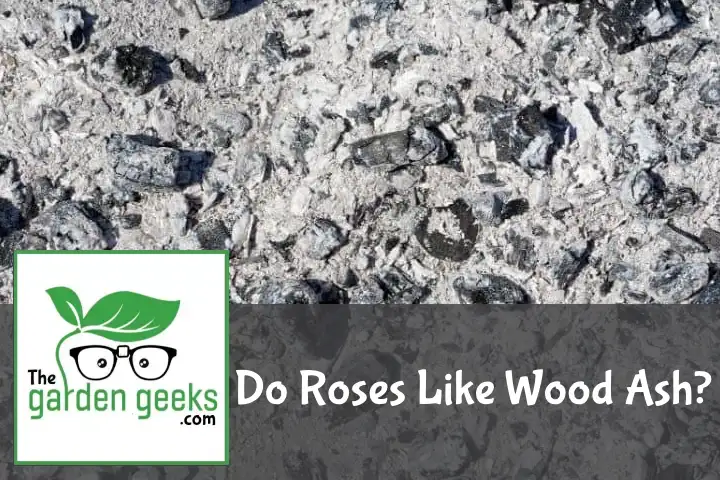Have you ever found yourself staring at a pile of wood ash from last night’s bonfire, wondering if it could be put to good use? Well, you’re not alone! As a rose enthusiast myself, I’ve often wondered: Do Roses Like Wood Ash?
As the saying goes, there’s no smoke without fire. And in this case, there’s no rose without proper care! Understanding how different elements affect your roses is key to ensuring their healthy growth. So let’s dive into the world of roses and wood ash. Keep reading about ‘Do Roses Like Wood Ash?’ for some blooming good insights!
Key Takeaways
- Roses do like wood ash as it is a good source of potassium and lime, nutrients that roses need to thrive.
- However, excessive use can lead to soil alkalinity which is harmful for roses.
- Wood ash should be used sparingly and mixed well into the soil.
- It’s recommended to test your soil pH before applying wood ash. If the pH is already high (alkaline), avoid using wood ash.

Understanding Wood Ash
Let’s dive into the world of wood ash. It’s more than just the remnants of a cozy fire; it’s a potential goldmine for your garden!
What is Wood Ash?
So, what exactly is wood ash? Well, it’s pretty much what it sounds like – the powdery residue left after wood is completely burned. This usually happens in your fireplace or wood-burning stove. But hey, don’t just sweep it under the rug! Outside of gardening, wood ash has a variety of uses. It can be used to melt ice on walkways, control pond algae, and even polish silver.
Composition of Wood Ash
Now let’s talk about what makes up this seemingly mundane substance. The chemical composition of wood ash typically includes calcium, potassium, and magnesium among other trace elements. These are all nutrients that plants need to thrive! Calcium helps strengthen plant cell walls while potassium plays a key role in photosynthesis and disease resistance. Magnesium? That’s essential for chlorophyll production.
| Component of Wood Ash | Benefits to Soil | Benefits to Roses |
|---|---|---|
| Calcium | Strengthens plant cell walls | Promotes healthy cell structure in roses |
| Potassium (Potash) | Aids in photosynthesis | Supports flower development and disease resistance |
| Magnesium | Essential for chlorophyll production | Enhances chlorophyll synthesis for greener leaves |
| Trace Elements (e.g., zinc, copper, manganese) | Boosts overall soil fertility | Encourages a variety of plant processes for healthier growth |
Benefits of Wood Ash in Gardening
So why should you consider using wood ash in your garden? First off, it can help improve soil health by increasing its pH level and adding valuable nutrients. This means healthier and happier plants!
Plus, using wood ash can also deter pests like slugs and snails from munching on your precious greens. So next time you’re cleaning out that fireplace or stove, remember – don’t trash the ash! Your roses might just thank you for it later.
So, do Roses Like Wood Ash?
Absolutely! Roses are fond of wood ash due to its rich nutrient content. They require essential elements such as potassium, phosphorus, magnesium, calcium, and nitrogen for optimal growth—all of which are abundant in wood ash. Specifically, the presence of potassium and phosphorus in wood ash is particularly beneficial for roses.


These essential nutrients aid not only in the robust growth of rose plants but also enhance root strength and stem solidity. Additionally, wood ash has an alkaline nature, making it particularly useful for roses planted in overly acidic soils. It helps in adjusting the soil’s pH level to a range (between 6 and 7) ideal for roses.
Roses gain advantages from a gentle application of wood ash during their growth season, prior to blooming. The ash’s substantial potash content is critical for the nourishment roses require to form and sustain vibrant, high-quality flowers.
Furthermore, wood ash is free from seeds or plant roots, unlike some composts or mulches derived from garden or kitchen waste, which might introduce weeds. This characteristic of wood ash means less time spent on weeding around your roses.
Other plants benefiting from alkaline soil conditions include citrus trees, lavender, garlic, asparagus, hydrangeas, and lettuces. While most roses show a preference for slightly acidic soils, certain varieties thrive in more alkaline conditions.
Varieties of roses that flourish in alkaline soils include names like Linda Campbell, Robin Hood, Square Dancer, William Booth, Fred Loads, Chuckles, Country Song, Elias, Fergus Gamez, JP Connell, and Morden Snowbeauty.
Roses and Their Soil Preferences
When it comes to rose gardening, the soil can make or break your success. Roses are a bit picky about their living conditions, and that includes the dirt they call home. They have specific soil requirements that need to be met for them to thrive.
| Soil Preferences for Roses | Impact of Wood Ash on Soil | Alignment with Roses’ Needs |
|---|---|---|
| Well-drained soil | Improves soil structure | Positive (if soil is too compact) |
| pH level close to neutral (6.0-7.0) | Increases soil pH level (alkaline) | Positive (if soil is too acidic), Negative (if soil is already neutral or alkaline) |
| Rich in organic matter | Adds nutrients and minerals | Positive (enhances soil nutrient content) |
| Adequate nutrients (NPK) | Supplies potassium and phosphorus | Positive (supplements nutritional needs) |
Ideal Soil Conditions for Roses
Roses crave well-drained soil. It’s like they want their feet wet, but not soaked, you know? The texture of the soil is also important. A good rose garden soil mix should feel loamy, not too sandy or clayey.
But wait, there’s more! Nutrient content is another biggie in the world of rose plant care. Roses are heavy feeders and require plenty of organic matter in their soil. So, don’t skimp on the compost when preparing your rose bed!
pH Levels Preferred by Roses
Now let’s talk about pH levels. If roses could talk, they’d probably say “keep it neutral.” That’s right folks; roses prefer a pH level close to neutral – not too acidic and not too alkaline.
A balanced pH level in the rose plant soil type helps roses absorb nutrients effectively. Too much acidity or alkalinity can lock up nutrients making them unavailable to the plants.
So remember folks, when it comes to adjusting pH in your rose garden, aim for balance! And always ask yourself: “Do Roses Like Wood Ash?” because wood ash can affect your soil’s pH level!



Impact of Wood Ash on Soil
Wood ash is a popular soil amendment in organic gardening. It’s like a secret sauce, adding flavor to your garden soil. But what does it really do? Well, it alters the pH levels and enriches the soil with nutrients. Let’s dig deeper into these wood ash benefits.
How Wood Ash Alters Soil pH
Ever wondered why your grandma always tossed wood ash in her rose garden? It’s because of its alkaline effect. Wood ash has liming properties that can reduce soil acidity.
Immediately after application, you’ll notice your soil becoming less acidic. Over time, this helps maintain a balanced garden soil pH level. So if you’re battling with acidic soil, wood ash might just be your new best friend!
Nutrients Added to Soil by Wood Ash


Now let’s talk about the nutrient party that wood ash brings to the soil. It’s packed with potassium and trace minerals which are essential for plant health improvement.
When added to compost, it creates a nutrient-rich mix that plants absolutely love! So next time you clean out your fireplace, remember – those ashes are gold dust for your garden!
Effect of Wood Ash on Rose Health and Growth
Wood ash has some pretty cool effects on roses. For starters, it’s packed with nutrients that roses crave, like potassium and phosphorous. This means using wood ash in gardening can give your roses a real growth spurt!
But wait, there’s more! Wood ash also helps neutralize acidic soil. And guess what? Roses aren’t fans of overly acidic soil. So adding wood ash can create a more comfortable home for your roses.
However, it’s not all sunshine and rainbows. Too much wood ash can lead to high alkalinity levels in your soil which isn’t great for your roses either. So remember folks, moderation is key when it comes to rose care with wood ash.
Studies and Expert Opinions on Using Wood Ash for Roses
There are quite a few studies out there that back up these claims about wood ash effect on roses. One study found that wood ash can indeed promote rose growth and health.
But don’t just take science’s word for it! Many expert gardeners swear by using wood ash for their roses too. They’ve seen firsthand how it can improve rose health and spur growth.
Yet again though, experts caution against overdoing it with the wood ash. They recommend testing your soil regularly to ensure you’re not tipping the pH balance too far one way or the other.
So there you have it folks – both science and garden gurus agree: roses do like wood ash, but only in moderation!
How to Use Wood Ash for Roses Safely
So, you’re wondering, do roses like wood ash? Well, they do! But it’s not as simple as dumping a pile of ash on your rose bed and calling it a day. Let’s dive into the nitty-gritty of wood ash uses in rose gardening, focusing on safe application and rose bed maintenance.
Correct Application of Wood Ash to Rose Beds
Applying wood ash to your rose beds can be a game-changer, but only if done correctly. The key is moderation. Sprinkle a thin layer of wood ash around the base of your roses. Avoid direct contact with the plant stem to prevent any potential damage.
This method ensures optimal nutrient absorption without overwhelming your precious blooms. Remember, too much of anything can be harmful, even something as beneficial as wood ash.
Potential Risks and How to Avoid Them
Now let’s talk about potential risks. Using excessive amounts of wood ash can lead to an unhealthy pH level in your soil. This could hinder optimal rose growth and result in less than healthy roses.
To avoid this garden disaster, test your soil pH regularly. If it gets too high (alkaline), balance it out by adding some organic matter or sulfur-based compounds.
Remember folks, safe rose gardening is happy gardening! Don’t let the fear of risks stop you from reaping the benefits of wood ash. With these handy-dandy garden safety tips, you’ll have blooming roses that are the envy of every green thumb on the block!
Alternatives to Using Wood Ash for Roses
If you’re asking, ‘Do Roses Like Wood Ash?’ you might also be curious about other options. There are plenty of rose care alternatives to wood ash, each with their own pros and cons. Let’s dive into the world of organic rose amendments and discover some substitutes for those times when wood ash isn’t the best choice.
Other Organic Amendments Beneficial for Roses
When it comes to organic rose amendments, there’s a whole garden of possibilities! One popular option is compost, which can provide a buffet of nutrients for your roses. It’s like giving them a five-star meal!
Another great choice is bone meal. This natural fertilizer is rich in phosphorus, which helps roses bloom beautifully. It’s like giving your roses a beauty treatment!
And let’s not forget about worm castings. These little nuggets of gold are packed with beneficial bacteria that improve soil health and boost rose growth.
When Not to Use Wood Ash: Suitable Substitutes
There are times when using wood ash may not be the best idea. For instance, if your soil is already alkaline, adding more ash could push the pH too high for roses.
In such cases, consider using coffee grounds as an alternative. They add organic matter and nitrogen to the soil while also helping to lower its pH level.
Another good substitute is Epsom salts. They provide magnesium and sulfur – two nutrients that roses absolutely love! So next time you’re wondering whether or not to use wood ash in your rose garden, remember there are plenty of other options out there!


To Wrap Up
So, Do Roses Like Wood Ash? Just like a toddler who’s found a new toy, roses can’t get enough of wood ash. However, remember that moderation is key – too much of a good thing can be harmful.
In the end, it’s all about balance. So sprinkle that ash and watch your roses bloom!


